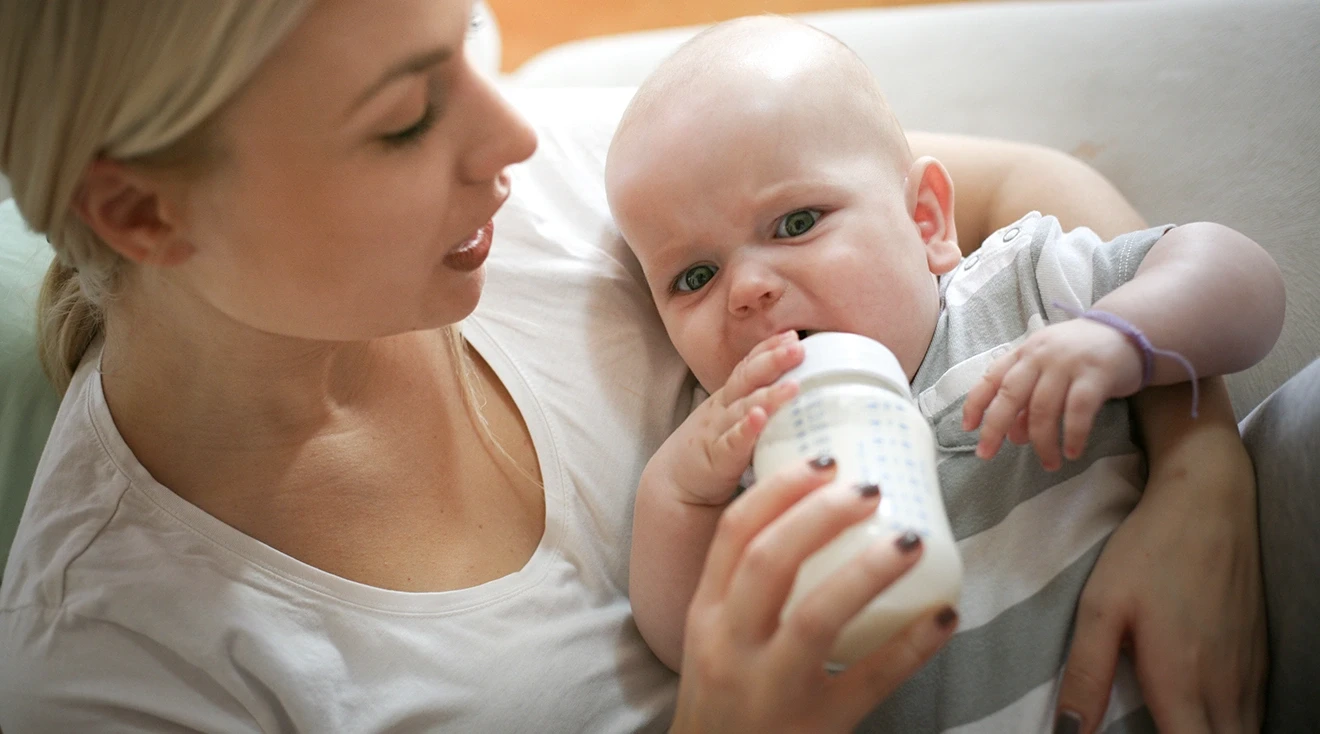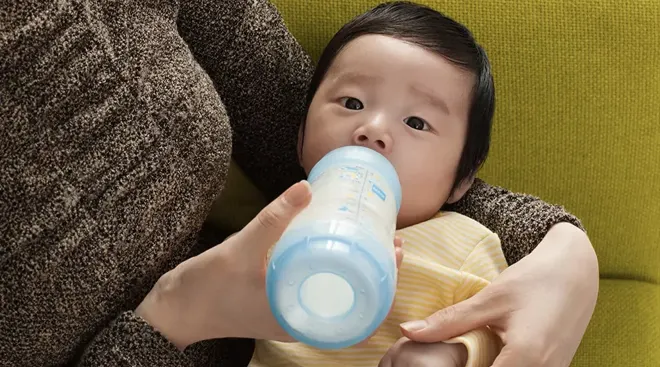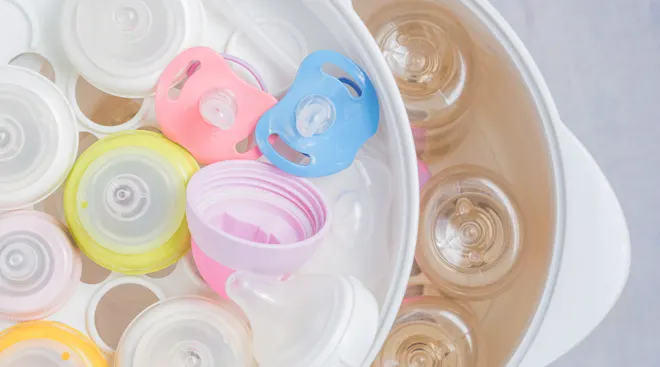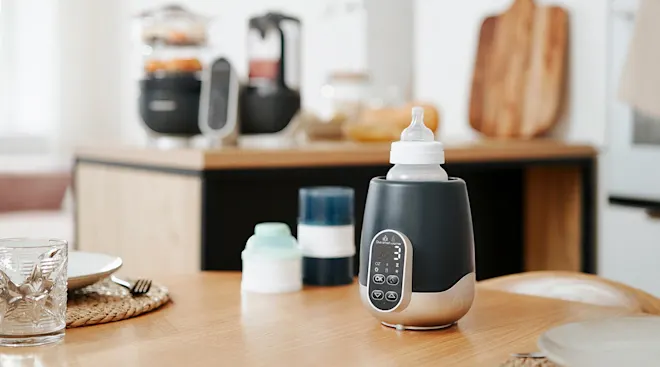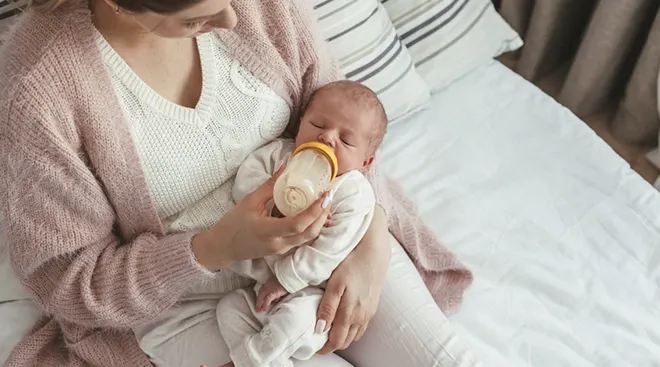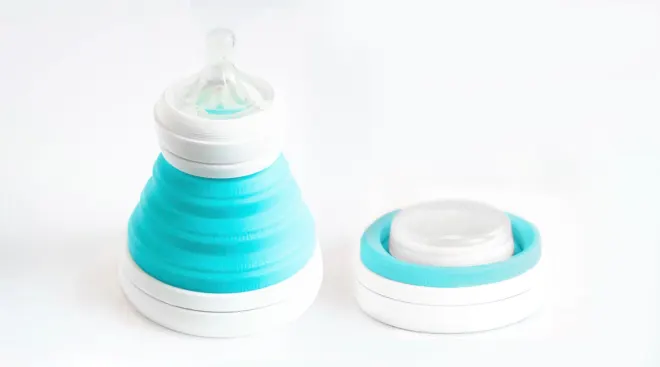What to Do When Baby Refuses the Bottle
Even if baby is breastfed, the time will come when you’ll want to introduce a bottle. It opens up a whole new world of new-parent possibilities, like returning to work, going on date nights or even sleeping for a solid chunk of hours while a non-nursing parent pitches in. But what do you do when baby is refusing a bottle? Sometimes bottle refusal is an issue from the get go; other times, it quite suddenly becomes a problem later on. Rest assured that this frustrating phase won’t last forever, and there are tricks you can try. So before you panic about your child starving at daycare, read on to learn how to get baby to take a bottle.
If you’re dealing with a baby who refuses the bottle, you’re probably inundated with well-meaning advice from friends and relatives. But according to lactation consultant Leigh Anne O’Connor, IBCLC, LCCE, “the most important thing is finding the root cause—and that can be tricky.” It can take some trial and error to figure out what’s really going on. Once you do, though, it’s easier to target the issue and come up with a solution. According to our experts, here are some common reasons why baby is refusing the bottle:
Nipple issues
One of the first things to consider is what kind of nipple you’re using on your bottle. “Some babies have strong preferences for nipple shape, size and material,” says Marielle Marquez, OTR/L, SWC, a pediatric occupational therapist, feeding specialist and lactation educator.
Additionally, nipple flow may play a role, says Marquez. Early on, baby needs a slower flow nipple. As their suck reflex strengthens, they can upgrade to a faster speed. If baby is suddenly refusing a bottle and you haven’t yet moved to a faster flow nipple, give that a try first.
Bottle temperature
Whether baby’s bottle is filled with expressed breast milk or formula, it can be tricky to get the temperature just right. Too hot is obviously a no-no, and some babies may not prefer milk that is too cold. Some babies couldn’t care less whether their bottle is cool or warm, but many have a strong preference and will be quite vocal about it.
Taste
Some babies are picky eaters from an early age. If you’re offering formula in a bottle and it’s just not clicking, the flavor may not be to baby’s liking. Although infant formulas are very similar, they can have a distinct taste; it may take some experimentation to find one that works, but talk to your pediatrician first, since the majority of babies should be on a cow’s milk-based infant formula.
Not hungry
This may sound obvious, but if baby refuses the bottle, one reason could be that they’re simply not hungry. Perhaps you’re trying to get them to take a bottle after breastfeeding or alongside solids. Maybe they’re less hungry at a particular time of day. Either way, it’s worth evaluating your routine and feeding schedule.
Colic
If baby is inconsolable for more than three hours a day, three days a week for three weeks or more, they likely have colic. Not surprisingly, an infant who is already extremely fussy may take a while to warm up to the bottle. The good news is that colic generally resolves on its own by before or by the time they hit the six-month mark.
Tongue tie
Victoria Regan, MD, a pediatrician at Children’s Memorial Hermann Hospital in Houston, says that tongue tie can affect feeding, but says that it “generally does not unless it’s severe, and this type is noticeable at birth.” Either way, if you suspect this may be an issue, talk to your pediatrician.
Gastrointestinal issues
Gastrointestinal issues, like reflux or constipation, could lead to a breastfed or formula-baby refusing the bottle. “Babies are smart, and if eating leads to feeling uncomfortable, they may begin to refuse the bottle or only eat a small amount to curb their hunger,” says Marquez. This is a common explanation if baby’s bottle refusal seems more sudden.
Thrush or virus
Sudden bottle refusal could be the result of illness or infection. If you look in baby’s mouth and see white plaque on the tongue or inside lips, it could be a fungal infection called thrush. Alternately, sores in the mouth are often due to a viral illness. Regan says to consult your pediatrician in either case, especially if baby is drinking way less than usual or has fewer than four wet diapers a day.
Congestion
Similarly, nasal congestion can make it harder for a baby to feed. If they’re stuffed up, Regan suggests placing a few drops of nasal saline in each nostril and then using a suction to remove mucus.
Teething
Is there anything that can’t be blamed on teething? If baby is sprouting some new noshers, then their mouth is likely in discomfort. This can lead to bottle refusal. Take comfort knowing that this too shall pass.
Oral motor dysfunction
Although oral motor dysfunction is typically diagnosed after a child is eating solids and speaking, early signs could include difficulty with sucking from bottles and choking or gagging when eating or drinking. There are many reasons why oral motor function can become impacted, and your pediatrician or a feeding specialist should be able to help diagnose it.
There are a lot of reasons why baby might be refusing the bottle, whether they’re turning their nose up from the get go or quite suddenly picky. Either way, it never hurts to consult your pediatrician to see if there may be a medical cause to the bottle refusal.
Getting the hang of breastfeeding can take some time. Once baby is in the swing of things, many mothers opt to pump so they have the option of also feeding their babies with expressed breast milk from a bottle. If your breastfed baby won’t take a bottle, you’re not alone—it can be a tricky transition. The reasons your breastfed baby is refusing the bottle could be one of the ones above, or it could be something else, including:
Timing
If you’re breastfeeding, introducing a bottle may not be a priority at first. Most lactation consultants recommend waiting a bit to ensure baby really gets the hang of breastfeeding first. Most pediatricians recommend introducing a bottle when breastfeeding is well established, around a month. But if you know you need to return to work soon—or you just need some more freedom—Marquez recommends introducing a bottle around the three- to four-week mark. “I have seen way too many moms wait several months before introducing the bottles, and many babies are resistant at that point, creating a very stressful situation for everyone involved,” adds Marquez.
Position
The position in which you are trying to bottle feed can also have an impact. Parents accustomed to breastfeeding may try to situate baby in a more horizontal position. But O’Connor warns that bottles flow differently, so it’s important to put your little one in a more upright position.
Taste
Babies can be sensitive to flavor and the flavor of breastmilk is influenced by what you eat. But if your breastfed baby won’t take a bottle, high lipase may be the culprit. Lipase is an enzyme found in breastmilk; if you produce too much of it, the enzyme works to break down fat content too quickly. If expressed milk with too much lipase is in the fridge for 24 hours or more—or is frozen and thawed—it will have an unpleasant soapy, sour or metallic taste. It’s not unsafe for baby, but they may refuse to drink it. You can try freezing the milk immediately after pumping to see if that helps.
Now that you know some of the reasons why baby may be refusing a bottle, it’s time to take action. If you’re wondering how to get baby to take a bottle, here are some simple tactics to try:
- Experiment. Swap out your nipples, or opt for different bottles altogether. Ensure the nipple flow is in line with baby’s age and developmental stage. You can also try a different formula to see if baby prefers the taste.
- Warm it up. If you normally serve a bottle cold or at room temperature, try safely warming it up.
- Use a syringe. In the newborn stage, if baby is refusing the bottle, Regan suggests using a feeding syringe.
- Adjust your position. Baby should be upright when drinking from a bottle, so the nipple initially makes contact with the roof of their mouth.
- Let baby experiment. “Take the bottle nipple off, and let baby play with it for a day or so; dip it in breastmilk, tickle their lips, play, so it’s something familiar,” suggests O’Connor.
- Try movement. “Motion will sometimes help baby to take a bottle,” says O’Connor. She suggests sitting on a yoga ball and bouncing, or holding baby and walking.
- Ask someone to pitch in. “Having someone other than Mom offer the bottle can help sometimes, especially for breastfed babies,” advises Marquez. “If Mom leaves the house, baby may be more accepting to take a bottle from another.”
- Try the bait and switch. “If baby is also breastfed, you can try breastfeeding first to satisfy them somewhat before offering the bottle,” suggests Marquez. Similarly, you can give baby their pacifier, and then try to quickly switch to the bottle. “This can get baby to a calm and organized state before trying to feed,” says Marquez.
- Upgrade to a cup. If baby is at least 6 months old, you might consider skipping the bottle and going straight to an open cup or straw, advises Marquez.
- Don’t force-feed. Remember, baby might not be hungry. If they’re refusing the bottle, give them space and time—and try not to stress about it.
If you have tried all of these tips and baby is still refusing a bottle, then it’s time to call in the professionals. Your pediatrician is always a good place to start. Marquez also highly recommends working with an occupational therapist or speech therapist with training in feeding and swallowing. “An experienced feeding therapist can help you try to figure out what the underlying issues are, and lead you to other helpful specialists and interventions,” she adds.
Whatever the reason for bottle refusal, try to stay the course. With some patience and knowledge, you’ll have baby drinking happily in no time. “It’s important to say that babies are not stubborn and manipulative; sometimes it’s something new, and there can be resistance,” says O’Connor.
Please note: The Bump and the materials and information it contains are not intended to, and do not constitute, medical or other health advice or diagnosis and should not be used as such. You should always consult with a qualified physician or health professional about your specific circumstances.
Plus, more from The Bump:
Marielle Marquez, OTR/L, SWC, CLEC is a pediatric occupational therapist with an advanced certification in feeding and swallowing. She specializes in working with infants and toddlers, and is certified as a lactation educator. She is also the founder of Thrive Little.
Leigh Anne O’Connor, IBCLC, LCCE is a lactation consultant with more than two decades of experience working with breastfeeding families. She is also a Lamaze-Certified Childbirth Educator.
Victoria Regan, MD, is a board certified pediatrician at Children’s Memorial Hermann Hospital in Houston, one of the largest health systems in Texas. Regan currently serves as senior vice president over Women's and Children's care at Memorial Hermann Health System.
Learn how we ensure the accuracy of our content through our editorial and medical review process.
Navigate forward to interact with the calendar and select a date. Press the question mark key to get the keyboard shortcuts for changing dates.
































